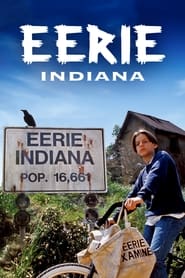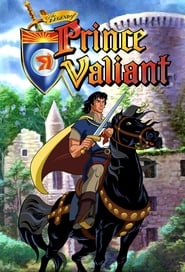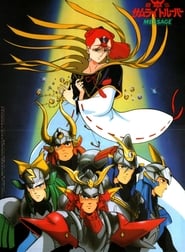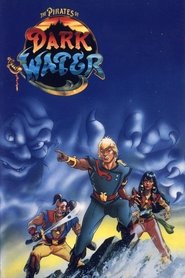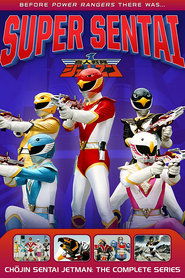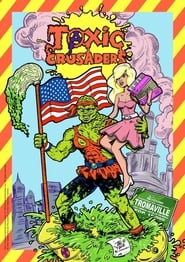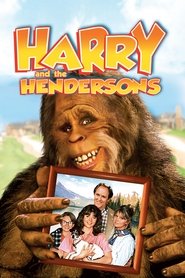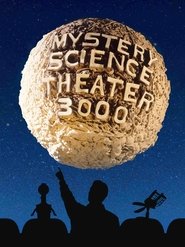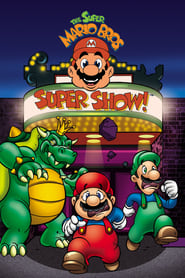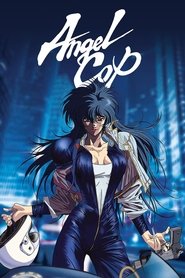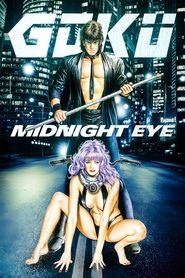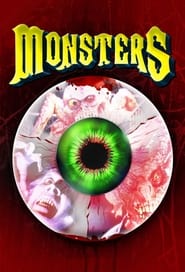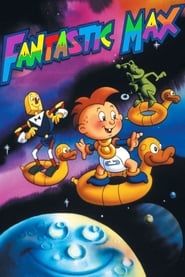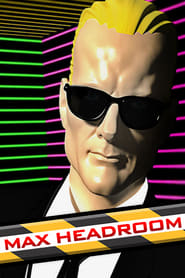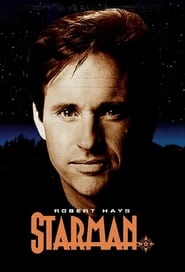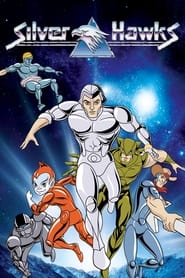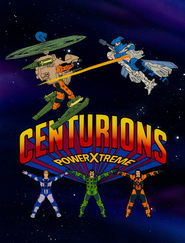New Sci Fi Fantasy TV Series on Tubi TV - Page 22
-
Eerie, Indiana
1991
Eerie, Indiana
1991
star 7.5Teenage weirdness investigator Marshall Teller adventures through his new small-town home with his friends, geeky Simon Holmes and mysterious Dash X. -
The Legend of Prince Valiant
1991
star 6.5After his kingdom is usurped, Prince Valliant sets out on a thrilling quest to find Camelot and join King Arthur's Knights of the Round Table. -
Ronin Warriors: Message
1991
star 8.5A 300-year-old book is discovered which chronicles the adventures of the legendary Samurai Troopers... centuries before they happen! But what does this mean? Are the Troopers merely puppets in some cosmic play, acting out parts? Who is this mysterious Suzunagi, a mysterious girl who entices each of the warriors with their hearts' desire - salvation, new armors, freedom from a life of fighting. Why is she so interested in the troopers and their armors? -
The Pirates of Dark Water
1991
star 7.5When Ren, a young son of a lighthouse keeper, rescues a stranger foundering in the rocks near his home, he learns the man was an aide to his true father, a great King. Ren is given a magic compass crystal that guides him to a dragon who shows him that the only way to claim his heritage is to find the Thirteen Treasures of Rule. Unfortunately, a pirate ship captained by the evil Bloth is also aware of this treasure and is relentlessly pursuing Ren for it. On his side, Ren soon acquires companions like Ioz the Pirate, Tula the Eco-Mage, and Niddler the Monkey-Bird, who help him in his quest. That quest becomes all the more urgent when Ren learns that the Dark Water, a carnivorous form of water that consumes anything it snares, threatens to envelope and destroy his world and only the treasures he seeks can stop it. -
Chōjin Sentai Jetman
1991
Chōjin Sentai Jetman
1991
star 7.9The Sky Force sends five highly trained operatives to participate in an experiment which will expose them to Birdonic Waves, resulting in superhuman abilities. But when the Earth Ship is attacked by Vyram, the majority of the Birdonic Waves are sent to Earth and find four unsuspecting civilians. Now, it's up to these four accidental super humans – Raita, Kaori, Ako, and Gai – alongside Ryu, the only original operative to receive Birdonic Waves, to defend their dimension against Vyram. -
Toxic Crusaders
1991
Toxic Crusaders
1991
star 5.9Loosely based on the 1984 B-horror comedy film The Toxic Avenger, Toxic Crusaders is a syndicated 13-episode animated series created by Lloyd Kaufman and Michael Herz. Like the source material, Toxie is a grotesque mutant endowed with superhuman powers, but is still a good-hearted and law-abiding citizen of the fictional town of Tromaville, New Jersey; the setting of most of Troma Entertainment's films. In a change from the films, the toxic waste mutated his mop into a sentient entity that sometimes battles enemies by itself or gives him ideas on how to solve problems. The villains include Czar Zosta, Dr. Killemoff, and Psycho, polluters from the planet Smogula who wreak ecological havoc with help from Tromaville's corrupt mayor, Grody. Bonehead, a street punk who bullied Melvin, joins them in the first episode. -
Harry and the Hendersons
1991
star 5.8The Hendersons, an upwardly mobile Seattle family, bring home what they believe to be a dead Bigfoot. But he has only been wounded by a hunter, and the Hendersons offer the creature who they come to call Harry a temporary home until a recovers his health. -
Mystery Science Theater 3000
1989
star 7.7A stranded spaceship pilot captured by mad scientists survives a blitz of cheesy B movies by riffing on them with his funny robot pals. -
The Super Mario Bros. Super Show!
1989
star 7In 1989 the two most famous plumbers from Brooklyn burst out of the Nintendo game world and onto television screens across America. The Super Mario Bros. Super Show! aired weekday afternoons and brought Mario, Luigi, Princess Toadstool and King Koopa more thrilling adventures as cartoon characters. And if that weren't enough, each episode also contained live-action segments featuring Mario and Luigi running their Brooklyn plumbing shop - all before they were flushed down a drainpipe into the Mushroom World. -
Angel Cop
1989
Angel Cop
1989
star 6.1In the future, Japan is in the grip of terrorism, and the police have become as brutal as the criminals. The Special Security Force stands out, led by the fearless Angel, an elite agent who, alongside her partner Raiden, investigates a series of brutal murders. -
Ranma ½
1989
Ranma ½
1989
star 8.6Ranma Saotome, a teenage martial artist, and his father Genma travel to the 'cursed training ground' of Jusenkyo in China. There, despite the warnings of the Chinese guard, they fall into the cursed springs. From now on, whenever Ranma is doused in cold water, he turns into a girl and a cute, well-built redhead at that. Hot water changes him back into a man again, but only until the next time. To make matters worse, his father engages him to Akane Tendo, a girl who hates boys. -
Goku Midnight Eye
1989
Goku Midnight Eye
1989
star 7.1Goku is a detective who has an "eye of god", a mysterious group gave him this artificial eye that enables him to control any computer. -
Monsters
1988
Monsters
1988
star 7.1Monsters is a syndicated horror anthology series which originally ran from 1988 to 1991 and reran on the Sci-Fi Channel during the 1990s. As of 2011, Monsters airs on NBC Universal's horror/suspense-themed cable channel Chiller in sporadic weekday marathons. In a similar vein to Tales from the Darkside, Monsters shared the same producer, and in some ways succeeded the show. It differed in some respects nonetheless. While Tales sometimes dabbled in stories of science fiction and fantasy, this series was more strictly horror. As the name implies, each episode of Monsters featured a different monster which the story concerned, from the animatronic puppet of a fictional children's television program to mutated, weapon-wielding lab rats. Similar to Tales, however, the stories in Monsters were rarely very straightforward action plots and often contained some ironic twist in which a character's conceit or greed would do him in, often with gruesome results. Adding to this was a sense of comedy often lost on horror produc -
Freddy's Nightmares
1988
Freddy's Nightmares
1988
star 7.2The evil, sinister killer of the "Nightmare On Elm Street" movies, Freddy Krueger, hosts this show, where each week, he shows us a tale of evil and death about the lives of people who live in Springwood. -
Fantastic Max
1988
Fantastic Max
1988
star 7.4A diaper-wearing toddler with a mohawk named Maxwell "Fantastic Max" Young has adventures in outer space with two of his toys: FX, a pull string alien doll from a planet called Twinkle-Twinkle, and A.B. Sitter, a C-3PO-like android made of blocks. -
Kimagure Orange Road
1987
Kimagure Orange Road
1987
star 6.7Kyosuke Kasuga, fifteen, moves to a new city and falls for Madoka Ayukawa. She's friendly when they're alone, but acts like a delinquent when in front of others. Kyosuke meanwhile struggles not to break the heart of Hikaru Hiyama, who fell in love after seeing him make an impossible basketball shot. To add the cherry to this particular sundae, Kyosuke and his family (sisters, grandfather, and cousins) all have various powers. And while Kyosuke's desperate to keep those powers a secret, his younger sisters (among others) aren't quite as concerned about it. -
Max Headroom
1987
Max Headroom
1987
star 6.8Television networks battle one another in an unrelenting ratings war. Whoever controls the airwaves controls the dystopic world in which they broadcast. So when Network 23's star reporter, Edison Carter, uncovers a deadly secret that could shake up the station's dominion over its viewers, the only option is to eliminate Carter before he can make his story public. After Carter's "accident," his mind is uploaded to create the world's first self-aware, computer-generated TV host — Max Headroom! But will Max bow to his creators? Or will he be the key to his human alter ago bringing down a network superpower? -
Starman
1986
Starman
1986
star 6.9Starman is an American science fiction television series, starring Robert Hays and Christopher Daniel Barnes and continuing the story from John Carpenter's 1984 film. The series ran on the ABC network from September 19, 1986 to May 2, 1987. The series was an adaptation and sequel to a movie of the same name produced in 1984. -
SilverHawks
1986
-
The Centurions
1986
The Centurions
1986
star 7.3In the near future, Doc Terror and his cyborg companion Hacker unleash their forces to conquer Earth! Only one force can stop this evil: a handful of brave men. In specially created Exo-Frames, they can be transported anywhere to fuse with incredible assault weapon systems beamed down from the space station Skyvault, becoming man and machine, Power Xtreme! Max Ray, brilliant Sea Operations commander! Jake Rockwell, rugged Land Operations specialist! Ace McCloud, daring Air Operations expert! Whatever the challenge, they are ready - The Centurions!
 Netflix
Netflix
 Amazon Prime Video
Amazon Prime Video
 Apple iTunes
Apple iTunes
 Apple TV Plus
Apple TV Plus
 Disney Plus
Disney Plus
 Google Play Movies
Google Play Movies
 Paramount Plus
Paramount Plus
 Hulu
Hulu
 HBO Max
HBO Max
 YouTube
YouTube
 fuboTV
fuboTV
 Peacock
Peacock
 Peacock Premium
Peacock Premium
 Amazon Video
Amazon Video
 The Roku Channel
The Roku Channel
 AMC+
AMC+
 Kocowa
Kocowa
 Hoopla
Hoopla
 The CW
The CW
 Vudu
Vudu
 Starz
Starz
 Showtime
Showtime
 PBS
PBS
 Pantaflix
Pantaflix
 FXNow
FXNow
 Tubi TV
Tubi TV
 Kanopy
Kanopy
 Comedy Central
Comedy Central
 Crunchyroll
Crunchyroll
 Microsoft Store
Microsoft Store
 Redbox
Redbox
 Sun Nxt
Sun Nxt
 ABC
ABC
 DIRECTV
DIRECTV
 Crackle
Crackle
 Fandor
Fandor
 Plex
Plex
